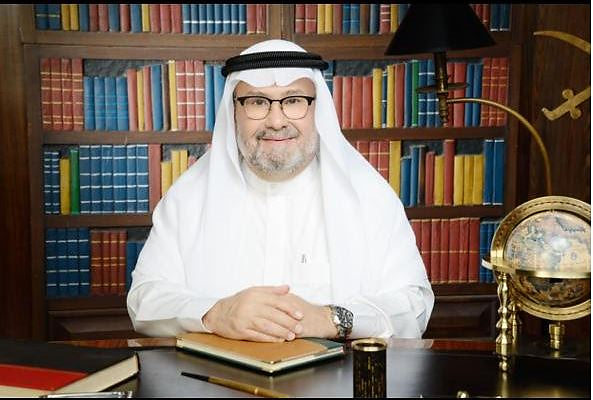THIRD INTERVIEW IN A FOUR-PART SERIES
by Genevieve Balance-Kupang
Ramadan Mubarak! This Sacred Month of Ramadan, I am one with our Muslim friends, as you offer significant supplications, carry out fasting and charitable works, reflect on the Holy Quran, and appreciate the blessings of your devout community.
As a researcher of world religions and a facilitator of multicultural education, I requested four Muslim associates to share their wisdom and how this life-threatening pandemic is shaping the solemn Ramadan celebrations within the Muslim community. They come from Saudi Arabia, Nigeria, Iran, and Afghanistan with diverse occupations.
Engr. Ossama Al Azzouni (Saudi Arabia)
This third interview features Engr. Ossama. I first met him when he graced the Sandiwa Anniversary Celebration at the Baclaran Redemptorist Church, Manila. He also participated in some interfaith activities organized by the Uniharmony Partners Manila, an interreligious movement. An ambassador of goodwill and a wise lecturer worldwide, Dr. Victoria Corral, and I (co-authors of a book, Introduction to World Religions for Senior High School published by C & E ) requested Sheikh Ossama to review our manuscript on Islam, which he did willingly.
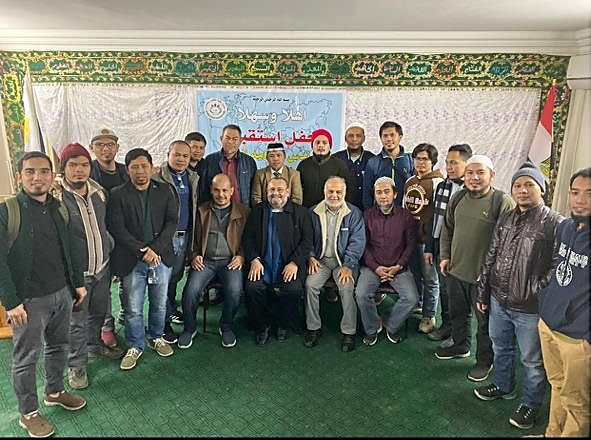
Engr. Ossama after the lecture for Filipino students in Cairo, Egypt.
Genevieve Balance Kupang: Greetings of peace, joy, and wellbeing, Engr. Ossama! Pressenza is honored to have you as part of this Ramadan interview series. Kindly say something about yourself, where you come from, and your belief system about Ramadan.
Engr. Ossama Al–Azzouni: From Saudi Arabia, I am a civil engineer and an international arbitrator for engineering disputes. I have my Engineering Consulting Office.
Yearly, when Ramadan month approaches, I used to receive questions from non-Muslim friends which includes fasting. Many asked how we bear hunger and thirst, and why we are happy when Ramadan is forthcoming. While it seems to be a hard time for us to fast from dawn until sunset for one month, we wait for it patiently every year.
Let me share with you some general information, reflections, and the deeper meaning of Fasting.
Fasting is a form of worship. It did not start with the Prophet Mohammad (Peace be upon him). It was a way of adoring and worshipping God by many prophets before him including Abraham, Zacharia, Moses, Jesus, Mary the Virgin, among others (peace be upon them all). All of them practiced fasting one way or another. Muslims believe that the essential message to all the Prophets since Adam till Mohammad (peace be upon him) is the same. It is the worship of One God (Allah) the creator, known as Monotheism. So, the message is one, but each Prophet has a certain law for his people serving the main message. God sent this law to each prophet to be applied by a group of people in a certain period until the final Prophet Mohammad (P b u h) came for the whole humanity and for every coming era. His teaching covered everything in our life which included Fasting.
For Muslims, the concept of Ebadah (worshipping) is not just the rituals the person does in a specific time and place. In Islam, it is comprehensive, with a broad and deep concept. It covers the entire life and actions of a person. To understand this more, we can see this chapter in the Quran called (Al- Maun) chapter 107.
سورة الماعون – Al-Mā‘ūn
أَرَءَيۡتَ ٱلَّذِي يُكَذِّبُ بِٱلدِّينِ
(1) Have you seen the one who denies the Recompense?
فَذَٰلِكَ ٱلَّذِي يَدُعُّ ٱلۡيَتِيمَ
(2) For that is the one who drives away the orphan
وَلَا يَحُضُّ عَلَىٰ طَعَامِ ٱلۡمِسۡكِينِ
(3) And does not encourage the feeding of the poor.
فَوَيۡلٞ لِّلۡمُصَلِّينَ
(4) So, woe to those who pray
ٱلَّذِينَ هُمۡ عَن صَلَاتِهِمۡ سَاهُونَ
(5) [But] who are heedless of their prayer [2000]
ٱلَّذِينَ هُمۡ يُرَآءُونَ
(6) Those who make show [of their deeds]
وَيَمۡنَعُونَ ٱلۡمَاعُونَ
(7) And withhold [simple] assistance
Worship is strongly related to social values. Muslims believe in judgment day; thus, they should be good to the orphans who are the weakest members of the society. Believers should answer the needy people, otherwise, the prayer as ritual is only for show and considered hypocrisy. Islam deals with the human being as a body needs material requirements and a soul needs spiritual feeding and balance both. This the secret of Muslims, a balanced life. We pray with reverence five times a day, doing good by being helpful and productive persons in our society.
GBK: In one of our conversations, you mentioned that some Islamic scholars classified fasting into various levels. Please elaborate more on this.
OAA: Some Islamic scholars classified fasting into various levels: first, to fast from eating, drinking, and physical intimacy between husband and wife. Second, fasting from saying bad words, backbiting, and insults. Further, the eyes must not look at forbidden things: hands, legs and all body parts should focus on doing righteous actions. Third, the heart must be cleared of hate, jealousy, and all kinds of social ills, and wishing the best for the others as you wish it for yourself.
Fasting is the fourth of the five pillars of Islam. The first is Shahada, bearing witness that Allah is one and Mohammad (P. b. u .h) is his prophet; Salah is praying five times a day; Zakat is paying 2.5% of the person’s savings, conserved for one year. Fasting is the fourth, and Hajj is the fifth pillar, the Pilgrimage to Holy Makkah once in a lifetime (for those who can afford it financially and physically).
God never imposes an order on us with no purpose and wisdom. We find this in this verse of the Quran (Al- Baqarah: 183) regarding fasting:
يَـٰٓأَيُّهَا ٱلَّذِينَ ءَامَنُواْ كُتِبَ عَلَيۡكُمُ ٱلصِّيَامُ كَمَا كُتِبَ عَلَى ٱلَّذِينَ مِن قَبۡلِكُمۡ لَعَلَّكُمۡ تَتَّقُونَ
(183) O you who have believed, decreed upon you is fasting as it was decreed upon those before you that you may become righteous – (ward off evil) (Taqwa).
So, have we found the purpose of fasting is to reach warding of evil?
What is ward off (evil)? it is Taqwa, and some of the characters of those people who are practicing Taqwa can be found in the Quran itself.
۞وَسَارِعُوٓاْ إِلَىٰ مَغۡفِرَةٖ مِّن رَّبِّكُمۡ وَجَنَّةٍ عَرۡضُهَا ٱلسَّمَٰوَٰتُ وَٱلۡأَرۡضُ أُعِدَّتۡ لِلۡمُتَّقِينَ
(133) And hasten to forgiveness from your Lord and a garden [i.e., Paradise] as wide as the heavens and earth, prepared for the righteous (who ward off evil).
Then the coming verses will explain some characters of the righteous people who are practicing Taqwa.
ٱلَّذِينَ يُنفِقُونَ فِي ٱلسَّرَّآءِ وَٱلضَّرَّآءِ وَٱلۡكَٰظِمِينَ ٱلۡغَيۡظَ وَٱلۡعَافِينَ عَنِ ٱلنَّاسِۗ وَٱللَّهُ يُحِبُّ ٱلۡمُحۡسِنِينَ
(134) Who spend [in the cause of Allāh] during ease and hardship and who restrain anger and who pardon the people – and Allāh loves the doers of good.
وَٱلَّذِينَ إِذَا فَعَلُواْ فَٰحِشَةً أَوۡ ظَلَمُوٓاْ أَنفُسَهُمۡ ذَكَرُواْ ٱللَّهَ فَٱسۡتَغۡفَرُواْ لِذُنُوبِهِمۡ وَمَن يَغۡفِرُ
ٱلذُّنُوبَ إِلَّا ٱللَّهُ وَلَمۡ يُصِرُّواْ عَلَىٰ مَا فَعَلُواْ وَهُمۡ يَعۡلَمُونَ
(135) And those who, when they commit an immorality or wrong themselves [by transgression], remember Allāh and seek forgiveness for their sins – and who can forgive sins except Allāh? – and [who] do not persist in what they have done while they know.
أُوْلَـٰٓئِكَ جَزَآؤُهُم مَّغۡفِرَةٞ مِّن رَّبِّهِمۡ وَجَنَّـٰتٞ تَجۡرِي مِن تَحۡتِهَا ٱلۡأَنۡهَٰرُ خَٰلِدِينَ فِيهَاۚ وَنِعۡمَ أَجۡرُ ٱلۡعَٰمِلِينَ
(136) Those – their reward is forgiveness from their Lord and gardens beneath which rivers flow [in Paradise], wherein they will abide eternally, and excellent is the reward of the [righteous] workers.
We see how Fasting is so important to purify the self. It is like a training period to learn many things in our life, and to discipline ourselves in how: 1) to obey Allah and follow his orders; 2) to control our desires and be masters of our desires not the opposite and this makes us human not animals which are driven by desires; 3) to be honest in worshipping Allah. When the Fasting person is alone, he can eat and drink for example while nobody will see him, but Muslims never do that because they are doing this for Allah. Fasting allows us to appreciate the graces Allah gave us which we should not take for granted. We ought to thank God for them. We feel the value of the gifts or graces when we miss them. Fasting enables us to feel the needy and the hungry people, and for that you find many Muslims pay their zakat (charity) during Ramadan. At the end of Ramadan, Muslims give a special charity called (Breakfast charity) which is mainly food for the needy.
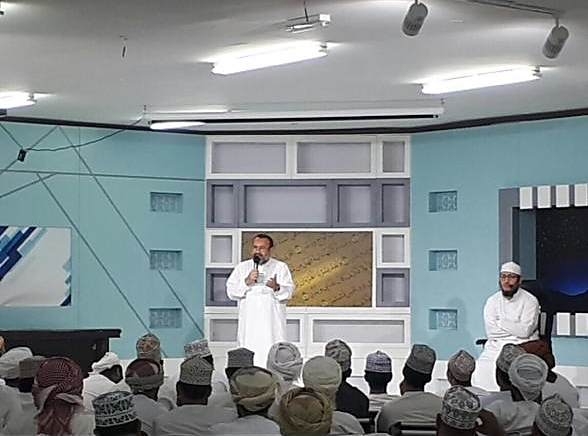
Engr. Ossama in Oman giving a course on how to reflect on the Holy Quran and apply its teachings in life.
GBK: Why is Ramadan called the month of the Holy Quran?
OAA: The Holy Quran started to be revealed to Prophet Mohammad (p. b. u. h.) through angel Jibril in Ramadan. You find Muslims reading the Quran daily in Ramadan and try to apply its teachings.
The Holy Book should be read throughout the whole year, but in Ramadan, more Muslims are more focused on doing this. Fasting leads us to concentrate on the spiritual aspect of life, leading us to balance the inner aspect of our life, a way of completing the whole year in a good way until next the Ramadan, recharged again with this super energy which fasting affords us to have.
GBK: Aside from the entire month of Ramadan (the ninth month in the Islamic calendar), are there days within the year when Muslims fast?
OAA: Many do not know that Muslims fast within the year in different days but none of it is an imposed duty like Ramadan. All the other fasting days is optional, called (Sunnah). This means that Prophet Mohammad fasted on those days. Hence, Muslims who follow it, as an additional form of worship, will be rewarded accordingly. Those who do not, will not be accused. To illustrate, some Muslims fast every Monday and Thursday of every week. Others for example, fast during Ashura, the day Allah saved Prophet Moses and his followers from Pharaoh and the open sea for them to cross on the land. This shows that Muslims believe in all Prophets since Adam until Mohammad (p. b.u. them all). For many others, Muslims fast voluntarily.
GBK: During this pandemic, which aspect of your belief system and spiritual practice is helping the Muslim community alleviate the sufferings of people? How is your religion supporting your community to cope with the impact of this life-threatening virus?
OAA: Muslims believe that everything that is happening in this universe, or not happening is God’s will and by his permission, and has a purpose. There is wisdom behind it. With our limited capacity as human beings, many think that when terrible, unpleasant things happen, they are ultimately bad. They teach us lessons and we become better as persons. This does not mean as many imagine that Muslims just surrender and leave things running by themselves, watching without doing anything.
Muslims should do their best, then accept the result. Facing the Covid19 Pandemic is the same for Muslims. We also use all the means for protection. We are locked down, wear masks, use disinfectants, observe quarantine, use vaccination and do as everybody does. We accept the result as it is God’s will. Hence, you do not find that Muslims generally get so upset, panic, or fight for the food in the supermarkets to hoard. Or feel depressed and worried for the future.
Muslims learned this since 1442, the year the message of Islam started. If we look closer at the Covid-19 issue, we will find that actually people are not afraid of the virus itself but are afraid of death. Death for Muslims (and should be for everybody), is everybody’s destiny. All of us will face it one day. As Muslims used to say: “the reasons are many, and death is one.” This means that death is death but there are different means to die. It could be caused by sickness, car accidents, COVID-19, or even with no tangible reason, people die, just by God’s will.
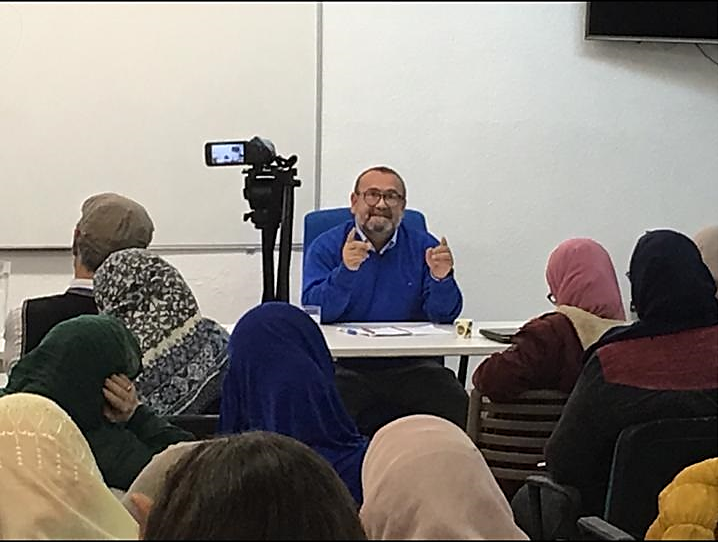
Spanish Muslims Annual Camp attended by Muslim and non-Muslim relatives and friends with amazing activities where everybody together. Valencia, Spain.
GBK: Muslims are admired for their recitation and devotion to the 99 names of God. Which one is most helpful for you during this pandemic?
OAA: Muslims use the names and characters of Allah daily. For example, before Muslims do any action, they start with this line “By the name of Allah, the Most Beneficent, the Most Merciful.” These names are part of the famous 99 names scholars counted. Some scholars counted more than 99 names.
When Muslims use these names daily, they reflect on their life and their way of thinking, establishing in the end, a certain paradigm which Muslims practice in their life. So, if you combine COVID-19, fasting, and the Muslims’ paradigm, you will find an amazing result of symbiosis and solidarity between people, and how the rich give to the poor, and how families and neighbors help and care for each other. This symbiosis is found in Muslim life. With or without Covid-19, life is full of trials.
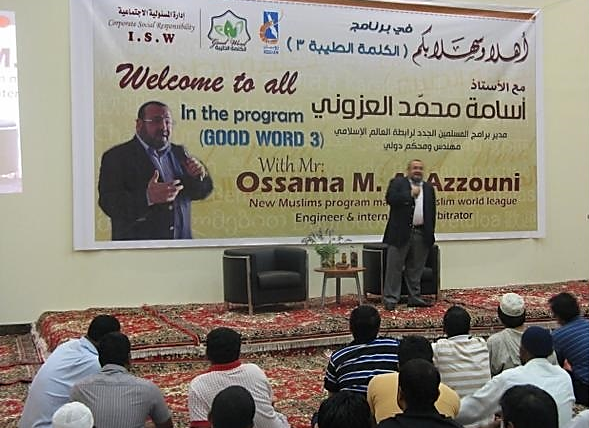
Am I Happy? A lecture with the foreign workers in the biggest shrimp farm in the world, K.S.A.
GBK: I like the term symbiosis. The interdependence and cooperation which I have experienced a lot in the farming community where I am currently in lockdown, and the bourgeoning of community pantries in our country. What a beautiful sight to see when real caring is felt and lived among us. What are your dreams for humanity’s better future? What has this critical time of Covid19 taught you as a believer of Islam?
OAA: If we reflect on what we mentioned in the more than one year experience of COVID-19, we will find a lot of wisdom and lessons that help us become better human beings.
Allah said in the Quran. وَمَا نُرۡسِلُ بِٱلۡأٓيَٰتِ إِلَّا تَخۡوِيفٗا (59) الإسراء-
(And I do not send signs except as a warning for the people, so that they believe).
While the whole world is facing the pandemic, we see earthquakes, volcanoes, storms, and all kinds of natural disasters also happening in certain places. This led us to think deeper about how this unseen virus can outshine all the technology and the advanced science of our world. Is it a clear message for us not to be arrogant by our material power? Isn’t it a sign that the entire world has been frightened and terrified by this small unseen creation? What if bigger trials will come our way?
So, my advice for ourselves as humans, do not be arrogant, whatever we achieve by our science or wealth.
Everything can perish in a second if God wills it. And to nonbelievers, now there is a virus you cannot see, but this does not mean that it is not existing. You can feel its existence by its signs and symptoms. Aren’t you are not believing in God because you cannot see? At the same time, you are ignoring the signs of God everywhere in this universe including ourselves. Please reflect on this creation around us. You can discover an amazing sign that behind it is a great wise creator. The matter is not only about the big bang. We can learn from COVID-19 that there is no superpower on earth that can face God’s will.
We must differentiate between the sickness itself and the symptoms. Most of the time, we are busy dealing with the symptoms and forget about the origin of the sickness.
GBK: Share your message of solidarity and hope for Ramadan amidst the covid19 pandemic.
OAA: My dream for humanity is to wake up now before it is too late. This virus allowed us to think deeper and wider, to free ourselves from the real sickness inside us. This illness is like a cancer eating human civilization. We are busy dealing with the symptoms and forget about the real Cancer which is simply the (E G O). The cells in the body of humanity which were created pure and good have become Cancer cells- this E G O brought us to losing our humanity!
The EGO is the source of hate, jealousy, tribalism, racism, selfishness, extremism, and self-centrality. It will be at its most dangerous when it will be a (collective E G O) because it will be based on separation and identification.
So, people will be against each other. The real dangerous virus is the person with no divine and humane values controlling him.
According to statistics, around 12000 people die every day from hunger. Many of them are children. Experts expect that the victims of hunger will reach 132 million people who will die this year while some people in many places worldwide are throwing food in the garbage. Some producers throw some crops in the ocean to keep their prices high.
Also, every year, 6 million die of the effect of smoking and 3 million of alcohol. Every second 24 die from car accidents worldwide. Not to mention the victims of wars, crimes and the genocides happening around the world by colonization regime and by wars. Most of this is because of human greed, a manifestation of the EGO controlling the decision-makers around the world.
My message for solidarity of the human being:
قُلۡ يَـٰٓأَهۡلَ ٱلۡكِتَٰبِ تَعَالَوۡاْ إِلَىٰ كَلِمَةٖ سَوَآءِۭ بَيۡنَنَا وَبَيۡنَكُمۡ أَلَّا نَعۡبُدَ إِلَّا ٱللَّهَ وَلَا نُشۡرِكَ بِهِۦ شَيۡـٔٗا وَلَا يَتَّخِذَ بَعۡضُنَا بَعۡضًا أَرۡبَابٗا مِّن دُونِ ٱللَّهِۚ فَإِن تَوَلَّوۡاْ فَقُولُواْ ٱشۡهَدُواْ بِأَنَّا مُسۡلِمُونَ (64)
- Say, O Messenger: O Jews and Christians, People of the Scripture, come let us unite on a fair word in which we are all equal: that we worship Allah alone and we do not worship anyone besides Him, no matter what his rank and no matter how high his status is; and that we do not take one another as lords to be worshipped and followed besides Allah. If they turn away from the truth and fairness that you call them towards, then, O believers, say to them: Bear witness that we have surrendered to Allah and are obedient to Him.
Stop letting our E. G.O. be the center of our lives and replace it with God, so we discipline our E.G.O. and use it in a good way to spread peace and love. We must treat the smallest element in our civilization which is this miracle called the human being. If the love relationship with God is absent in any society, this society will be dry and cruel. This leads us to fear and worry which can lead us to depression and desperation. Is this not what is happening in some societies nowadays around the world?
I am inviting every wise person to resist this cancer destroying our humanity. COVID-19 jolted us to feel that we are equal as human beings under the sky of God, our creator. Our creator is one, our density is one. Let us listen to each other instead of abusing one another. Learn from each other instead of listening to our ego. Let us love God the right way, so we can love each other, the right way.
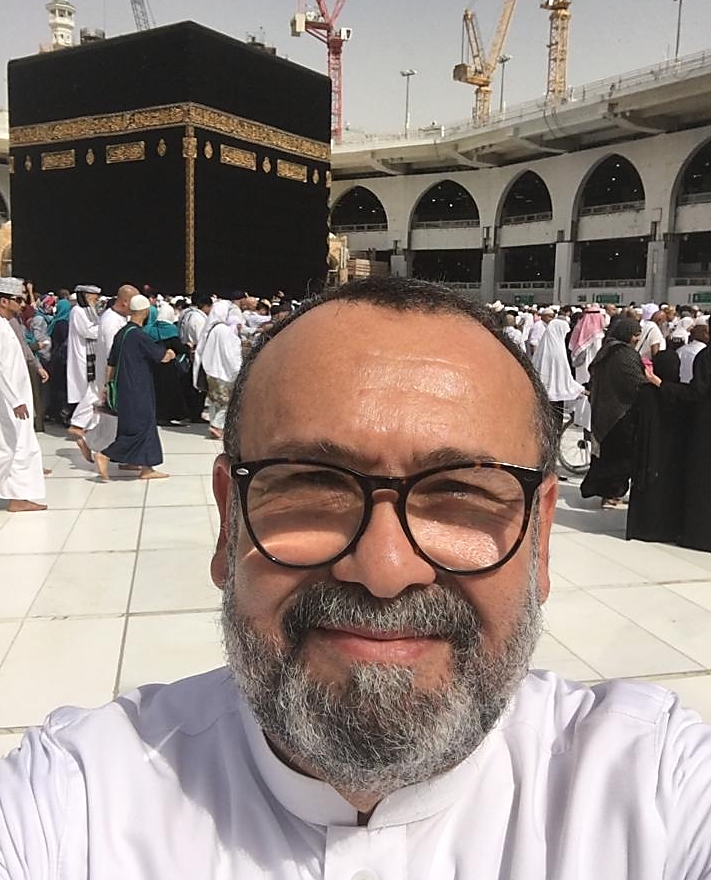
At the Holy Mosque in Makkah
GBK: Subhan Allah, Engr. Ossama! Let me convey my profound gratitude, esteem, and joy for your precious time, wisdom, and sharing. May Allah reward you with peace, good health, and abundance. May you continue to inspire and touch the hearts of others towards our common desire to live harmoniously with each other despite our differences, respecting diversity, and sharing love and peace with one another.
Next in the series is Mr. Bisharat Khodadad (Afghanistan). Here is the link to the first and second interviews: https://www.pressenza.com/2021/04/ramadan-amidst-the-covid-19-pandemic-an-interview-with-tandis-taghavi/.
About the author:
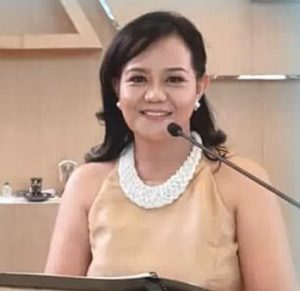 Genevieve Balance Kupang (Genie) is an anthropologist, consultant, researcher, and advisor to individuals and organizations engaged in working for good governance, genuine leadership, justice, integrity of creation, peace, the indigenous peoples, preservation of cultures, and societal transformation processes. She is a peace educator, author, an interreligious dialogue practitioner, and resource person with a career in the academe and NGO.
Genevieve Balance Kupang (Genie) is an anthropologist, consultant, researcher, and advisor to individuals and organizations engaged in working for good governance, genuine leadership, justice, integrity of creation, peace, the indigenous peoples, preservation of cultures, and societal transformation processes. She is a peace educator, author, an interreligious dialogue practitioner, and resource person with a career in the academe and NGO.


